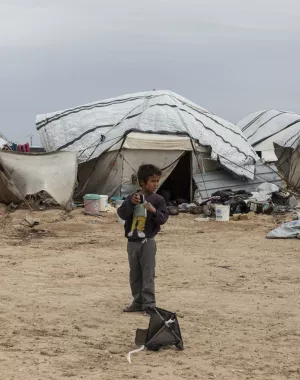This is also one of the most widespread, affecting tens of thousands of children across the globe at any given time. Not only is the deployment of children into combat unlawful, but their use facilitates multiple other human-rights abuses, including killing, maiming and sexual violence. It also denies affected children the right to education, health, a family life and other fundamental rights.
This report, the third in War Child’s series Being a ‘Force for Good’ on Children and Armed Conflict (CAAC), looks at how the UK government applies its legal obligations and commitments to prevent child recruitment and use, plus how it supports children’s release and reintegration. Fundamental to this is the principle that children associated with armed forces or armed groups (CAAFAG) are, first and foremost, victims of serious human-rights violations, who are entitled to assistance for their release and reintegration. This applies equally to British children who have been recruited by armed groups, as it does to children who are nationals of conflict-affected countries.
Based on consultations and interviews with nearly 50 experts working on CAAFAG-related issues, this report highlights the need for a more integrated, cross-government approach to CAAC. Specifically in relation to CAAFAG, there is a need to consider how children and their rights are impacted by policies and actions in areas such as: counter-terrorism and countering violent extremism; stabilisation and development support to conflict-affected and fragile States; military-support relationships; and diplomatic, political and other engagement with national authorities in conflict-affected countries.
Key messages
- Recruitment of girls and boys by armed forces and armed groups is one of the most serious and widespread violations against children in armed conflict.
- The recruitment of children exposes them to multiple other human rights abuses including killing and maiming and sexual violence. It also denies children their right to education, health and a family life.
- Under the Optional Protocol to the Convention on the Rights of the Child on the Involvement of Children in Armed Conflict, the UK is required to take measures to ensure that children are not used in hostilities and to prevent all recruitment of under-18s by non-state armed groups.
- Children who have been recruited by armed groups are first and foremost victims of serious human rights violations and are entitled to assistance for their release and reintegration.
- Under the Paris Principles, children should never be prosecuted or punished, or threatened with prosecution of punishment, solely for their membership of an armed force or armed group.
- The UK should encourage States where children are detained by security forces to adopt handover protocols to facilitate their safe transfer to civilian child protection actors for appropriate support.
- Young adults who were recruited as children should be recognised, first and foremost, as victims of crimes under international law, and provided with specialised support for their rehabilitation and reintegration.
- The UK must not partner with those who recruit, use and detain children. We must do more to protect children living in conflict zones.

